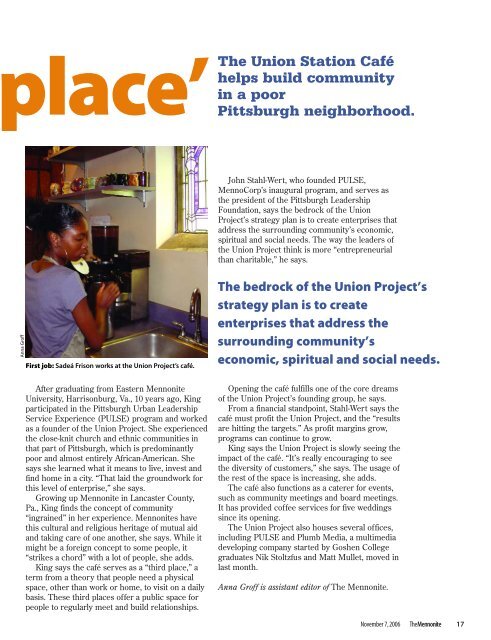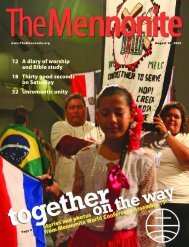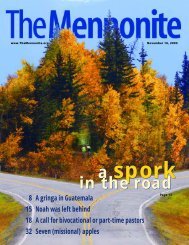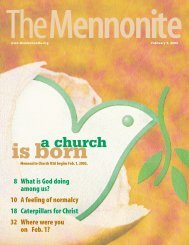11:7,6 - The Mennonite
11:7,6 - The Mennonite
11:7,6 - The Mennonite
You also want an ePaper? Increase the reach of your titles
YUMPU automatically turns print PDFs into web optimized ePapers that Google loves.
Anna Groff<br />
lace’ <strong>The</strong><br />
First job: Sadeá Frison works at the Union Project’s café.<br />
After graduating from Eastern <strong>Mennonite</strong><br />
University, Harrisonburg, Va., 10 years ago, King<br />
participated in the Pittsburgh Urban Leadership<br />
Service Experience (PULSE) program and worked<br />
as a founder of the Union Project. She experienced<br />
the close-knit church and ethnic communities in<br />
that part of Pittsburgh, which is predominantly<br />
poor and almost entirely African-American. She<br />
says she learned what it means to live, invest and<br />
find home in a city. “That laid the groundwork for<br />
this level of enterprise,” she says.<br />
Growing up <strong>Mennonite</strong> in Lancaster County,<br />
Pa., King finds the concept of community<br />
“ingrained” in her experience. <strong>Mennonite</strong>s have<br />
this cultural and religious heritage of mutual aid<br />
and taking care of one another, she says. While it<br />
might be a foreign concept to some people, it<br />
“strikes a chord” with a lot of people, she adds.<br />
King says the café serves as a “third place,” a<br />
term from a theory that people need a physical<br />
space, other than work or home, to visit on a daily<br />
basis. <strong>The</strong>se third places offer a public space for<br />
people to regularly meet and build relationships.<br />
Union Station Café<br />
helps build community<br />
in a poor<br />
Pittsburgh neighborhood.<br />
John Stahl-Wert, who founded PULSE,<br />
MennoCorp’s inaugural program, and serves as<br />
the president of the Pittsburgh Leadership<br />
Foundation, says the bedrock of the Union<br />
Project’s strategy plan is to create enterprises that<br />
address the surrounding community’s economic,<br />
spiritual and social needs. <strong>The</strong> way the leaders of<br />
the Union Project think is more “entrepreneurial<br />
than charitable,” he says.<br />
<strong>The</strong> bedrock of the Union Project’s<br />
strategy plan is to create<br />
enterprises that address the<br />
surrounding community’s<br />
economic, spiritual and social needs.<br />
Opening the café fulfills one of the core dreams<br />
of the Union Project’s founding group, he says.<br />
From a financial standpoint, Stahl-Wert says the<br />
café must profit the Union Project, and the “results<br />
are hitting the targets.” As profit margins grow,<br />
programs can continue to grow.<br />
King says the Union Project is slowly seeing the<br />
impact of the café. “It’s really encouraging to see<br />
the diversity of customers,” she says. <strong>The</strong> usage of<br />
the rest of the space is increasing, she adds.<br />
<strong>The</strong> café also functions as a caterer for events,<br />
such as community meetings and board meetings.<br />
It has provided coffee services for five weddings<br />
since its opening.<br />
<strong>The</strong> Union Project also houses several offices,<br />
including PULSE and Plumb Media, a multimedia<br />
developing company started by Goshen College<br />
graduates Nik Stoltzfus and Matt Mullet, moved in<br />
last month.<br />
Anna Groff is assistant editor of <strong>The</strong> <strong>Mennonite</strong>.<br />
November 7, 2006 <strong>The</strong><strong>Mennonite</strong> 17







